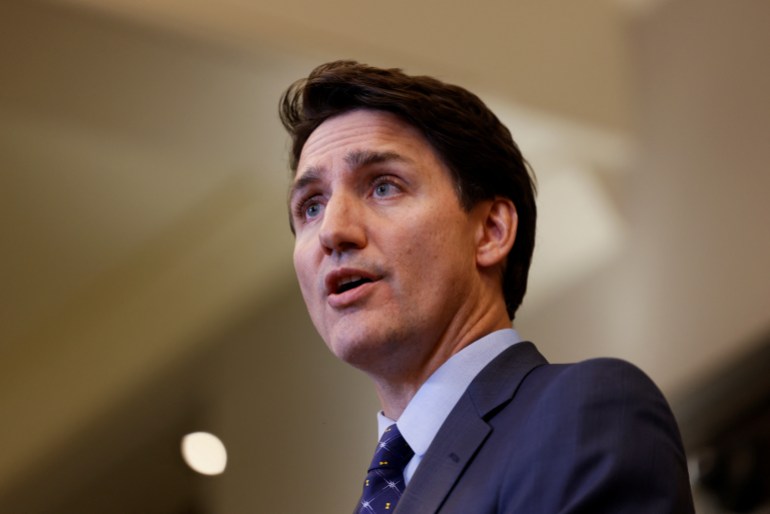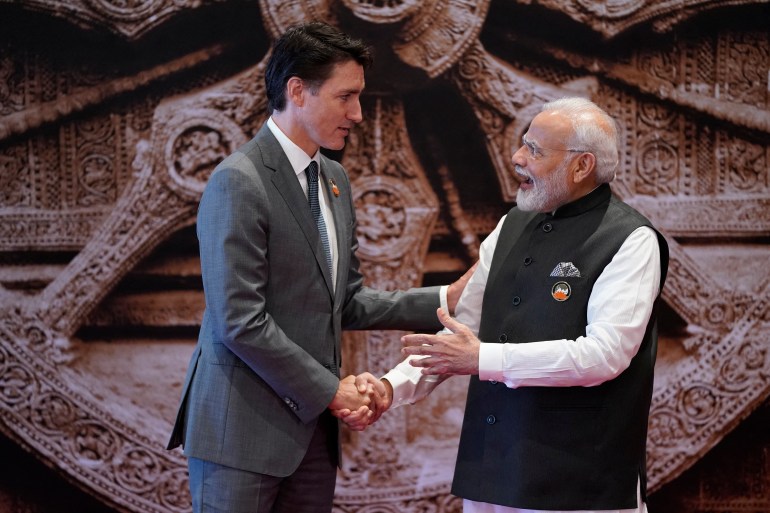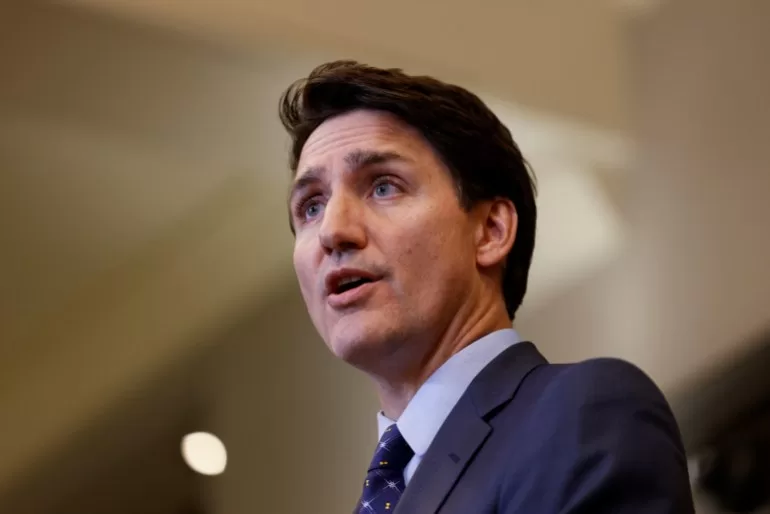EXPLAINER
Canada accuses Indian government agents of being involved in ‘serious criminal activity’, a claim India rejects.
A long-simmering diplomatic dispute between India and Canada has reignited, with the two countries announcing the expulsion of diplomats amid accusations that Indian government agents were involved in activities that threaten the safety of Canadians.
The latest row began on Monday when India’s Ministry of External Affairs said it had received “diplomatic communication” from Canada indicating that Indian diplomats were being considered “persons of interest” in relation to an investigation in the North American country.
Relations between New Delhi and Ottawa hit new lows last year after the Canadian government said it was investigating a link between Indian government agents and the killing of a Sikh separatist leader, Hardeep Singh Nijjar, on Canada’s west coast.
New Delhi has denied any involvement in Nijjar’s killing, reiterating on Monday that it “strongly” rejected the “preposterous imputations” from Canada and would be withdrawing its diplomats and other officials from the country.
But hours later, the Canadian government said federal police had uncovered evidence that Indian agents were involved in activities that threaten public safety in Canada and it said it was expelling six Indian diplomats.
Here’s what we know about the deepening diplomatic row, what Canada and India have said about the matter, and what could happen next:
What has Canada said?
- Canadian Prime Minister Justin Trudeau said on Monday that the federal Royal Canadian Mounted Police (RCMP) uncovered “clear and compelling evidence” that Indian government agents have engaged, and continue to engage, in activities that threaten public safety.
- “This includes clandestine information-gathering techniques, coercive behaviour targeting South Asian Canadians, and involvement in over a dozen threatening and violent acts, including murder,” Trudeau said during a news conference.
- Earlier in the day, the RCMP said it had found evidence of the involvement of Indian government agents “in serious criminal activity in Canada”, including links “to homicides and violent acts” and interference in democratic processes, among other things.
- “This evidence was presented directly to Government of India officials, urging their cooperation in stemming the violence and requesting our law enforcement agencies work together to address these issues,” the RCMP said in a statement.
- Canada’s foreign affairs department, Global Affairs Canada, then announced that six Indian diplomats and consular officials were being expelled from the country “in relation to a targeted campaign against Canadian citizens by agents linked to the Government of India”.
- India’s high commissioner to Canada was among those directed to leave.
- In a statement, Minister of Foreign Affairs Melanie Joly directly tied the Indian officials to Nijjar’s case: “The decision to expel these individuals was made with great consideration and only after the RCMP gathered ample, clear and concrete evidence which identified six individuals as persons of interest in the Nijjar case,” she said.

What has India said?
- India’s Ministry of External Affairs vehemently rejected Canada’s allegations, saying in a statement on Monday that “on the pretext of an investigation, there is a deliberate strategy of smearing India for political gains”.
- The ministry also said that the Canadian government “has not shared a shred of evidence” with the Indian government, “despite many requests from our side”.
- Later, the ministry said it had summoned Canada’s charge d’affaires in India to inform him that “the baseless targeting of the Indian High Commissioner and other diplomats and officials in Canada was completely unacceptable”.
- “We have no faith in the current Canadian Government’s commitment to ensure their security. Therefore, the Government of India has decided to withdraw the High Commissioner and other targeted diplomats and officials,” it said, adding that New Delhi “reserves the right to take further steps” in response.
- Then – in a tit-for-tat move – the ministry announced that it was expelling six Canadian diplomats from India, including the acting high commissioner, and was giving them until the end of the day on October 19 to leave India.

How did India-Canada ties reach this point?
- Tensions between the two countries skyrocketed in September 2023 after Trudeau announced that Canadian authorities were investigating “credible allegations of a potential link” between Indian government agents and the killing of Nijjar, a Canadian citizen.
- Nijjar was fatally shot on June 18, 2023, outside a Sikh temple where he served as president, in Surrey, British Columbia. He had been a leading advocate in what is known as the Khalistan movement, a Sikh campaign for a sovereign state in India’s Punjab region.
- While largely dormant inside India itself, Sikh separatism is largely viewed as a threat by the Indian government, which has urged Western nations to crack down on Khalistan movement leaders in the diaspora.
- India vehemently denied the allegations that it was involved in Nijjar’s killing, calling them “absurd”. It also accused Nijjar of being involved in “terrorism” – a claim rejected by his supporters.
- After Canada’s accusations were first made public, the two countries withdrew their respective diplomats and India also put a freeze on diplomatic services for Canadians.
- The tensions boiled over again in May 2024 when Canadian police said they had arrested three men – all Indian nationals – accused of being involved in Nijjar’s killing. The RCMP said at the time that it was also “investigating if there are any ties to the government of India”.
- A fourth man, also an Indian national, was arrested and charged in Nijjar’s killing later that month.
- New Delhi rejected the developments in Canada, with Minister of External Affairs Subrahmanyam Jaishankar saying the country had a “political compulsion” to blame India.
What comes next?
- It remains to be seen if India, as its foreign ministry said on Monday, would take “further steps” in response to Canada’s accusations – and if it does, what those steps could entail.
- Stephanie Carvin, a political analyst and professor at Carleton University in the Canadian capital of Ottawa, said the latest accusations by Canada were “very serious” and risked further hampering relations with India. That “puts Canada in a difficult position”, she said.
- “We’re in a time where we see countries around the world – the European Union, the United States, Australia … trying to develop their relations with India. This kind of puts us offside all of the other allies that we have,” she told Al Jazeera.
- Practically, Carvin also noted that Canada is home to a sizeable South Asian population and a large number of Indian students study in the country as well. “These Indian [nationals], they do need consular services, they need diplomatic representation in this country,” she said.
- Sikh Canadians told Al Jazeera over the past year that their community – which numbers about 770,000 people across Canada and makes up the largest Sikh diaspora outside India – had concerns about Indian state interference.
- The World Sikh Organization of Canada, a nonprofit that advocates for the community, said it welcomed the Canadian government’s announcement on Monday and demanded “the full prosecution of all individuals involved” in Nijjar’s killing, including Indian diplomats.
- “The Government of India’s ongoing foreign interference activities in Canada and its history of targeting Sikhs in this country is only now becoming known to the general public but has been the lived experience of Sikhs for the past four decades,” the group said.
